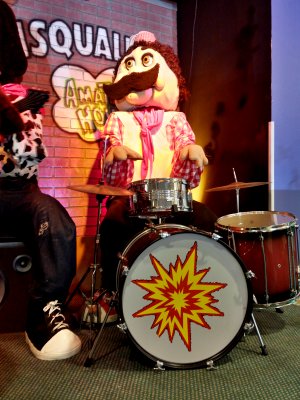If this turns out to be the end, I think that they had a good run…
9 minute read
June 13, 2020, 11:43 PM
Some of the news that has come out of the various retail groups that I’m in on Facebook has centered around the rather dire financial situation that CEC Entertainment, the company that owns Chuck E. Cheese, has found itself in lately. In short, with the coronavirus pandemic and related closures, that has put the company in a bad financial situation. The articles that I’ve read have indicated that bankruptcy and liquidation are probably in the company’s near future. And really, if that is how it ends, that’s not the worst thing in the world.
First of all, though, I find the moves that the company has made since pandemic-related restrictions put the kibosh on their normal business to be rather curious, because it has tended to lay bare certain aspects of the business that they would probably rather not have everyone realize. One thing that I’ve seen posted online is that the company is selling the prizes outright, whereas normally, they are only available by redeeming prize tickets from the games. The asking prices show what the company thinks that those prizes are really worth, including a profit margin, rather than having the games and tickets as a middleman to obscure the actual value of these things. It makes me think of the mug that I won at ShowBiz Pizza for around 100 tickets, mostly via an arcade version of Bozo the Clown’s Grand Prize Game, played for tickets. I remember that the game was relatively generous with tickets, giving out one ticket per bucket successfully hit. That’s why I played it, because this game gave up to six tickets per play, while most games only gave out one or two tickets per play. Thus if I wanted something good, this was the machine to do it with. So assuming a perfect play every time, to get 100 tickets would have required 17 plays, or $4.25. But it probably ended up costing us a bit more than that because at around eight years old, I was not capable of doing a perfect play every time, and even getting to the sixth bucket at all, let alone making it, was pretty rare for me. A more realistic estimate for my size and skill at that time would be three tickets per play, which would require 34 plays and cost $8.50. And this was not an $8.50 mug, by any means, especially not in 1989 dollars (around $18 in today’s money). The thing was probably only worth a dollar, even back then. We paid a lot more for it because you had to redeem tickets from the games for it. I imagine that if they sold the mug today for cash rather than tickets, it would probably reveal that we paid way more than we should have for that mug. But for the time, I accomplished what I was trying to do, and left with the mug, the satisfaction of having gotten a good prize, for once, as well as a massive headache. I did some major hurling that night, too. Totally worth it.
Then the other thing that I find curious is that the company launched a separate brand to sell pizza for delivery. Rather than calling themselves “Chuck E. Cheese”, they instead called themselves “Pasqually’s Pizza and Wings” for their delivery service, with no indication of any kind that they were Chuck E. Cheese. For those not familiar, Pasqually is one of the animatronic characters in Munch’s Make Believe Band, i.e. this guy:
Along with their using Pasqually as the name rather than their main mascot, it is worth noting that in an article by Food & Wine, the company was quoted as saying that, “[I]t is a different pizza that features a thicker crust and extra sauce, giving consumers a more flavorful, more premium pizza experience.” Translated, the company knows that (A) the Chuck E. Cheese brand has baggage, as it is known for serving up terrible pizza (and their pizza is indeed terrible), and (B) that no one would buy that crap if they were looking to buy pizza, rather than the food that happens to be served at a place to take the kids in order to feed them and tire them out. Thus in order to actually sell the pizza on its own merits, they had to upgrade it and give themselves a new name, because nobody wants to eat Chuck E. Cheese if they’re looking for a good pizza.
Through all of this, Chuck E. Cheese has essentially admitted that they are overpriced, they serve a low-quality product, and their brand has some serious image issues. And I can’t disagree with that. Of course, it’s not like the company is anything like it was in its heyday, anyway. Both Chuck E. Cheese and ShowBiz Pizza Place used to have better offerings than the modern company does. The company stopped updating its animatronic stages decades ago, and reduced the amount of characters on stage in new installations from five to one to zero, and then started actively removing the animatronics from its existing stores in favor of a dance floor for live shows. I also got the sense that the company lost sight of what the animatronic show was about. Both the early Chuck E. Cheese shows as well as The Rock-afire Explosion shows at ShowBiz were genuinely good. Both shows were solid entertainment for all ages. After all, according to company founder Nolan Bushnell, as reported in a Fast Company article, the show was aimed primarily at the adults, to give them some entertainment while they were waiting for the pizza to come out, and while the kids were spending money in the arcade. That continued, even after Chuck E. Cheese declared bankruptcy in 1984, and ShowBiz Pizza bought them out of bankruptcy, and even through Concept Unification, which gave all of the restaurants the same theming, they still aimed the animatronic shows at a general audience. Then some time in the 1990s, they changed Chuck E. Cheese’s voice to a much goofier sounding voice courtesy of Duncan Brannan, and dumbed the show down a bit, now aiming it at the kids rather than everyone, and talking down to them. And, as expected, the quality went down. It’s kind of telling when you look at the way that shows incorporating children’s songs were handled. In a later Rock-afire Explosion show featuring kids’ songs, Billy Bob describes it as “taking them back to their childhood memories today with these kiddie songs”. In other words, the show was still aimed at the adults, but the kids would probably enjoy it, too. Compare to a 2000s-era Chuck E. Cheese show, where the characters are introduced and then they immediately start singing “If You’re Happy and You Know It” (the worst and most obnoxious children’s song ever) like they mean it, and talking down to the kids. If I were there and they started playing that garbage with that voice, I think that my ears would start bleeding. The only time that song has been halfway decent was when it was used with different lyrics in a commercial to sell cat litter. Other than that, I never want to hear that song – ever. I’m just glad that when I visited on a nostalgia trip in 2012, the show was one of their better ones. But if you watch videos of the shows on YouTube, you will find a lot of stinkers amongst that good one in their show portfolio. I also find the live shows to be a bit of a non-starter, and I find the way that they get kids to participate in them, i.e. the distribution of free prize tickets, to be a bit degrading for the kids. Watch for yourself in the Laurel, Maryland location (same location that I visited), and you’ll see that they just throw the free tickets out of a box onto the floor, and then all of the kids rush in to pick the tickets off of the floor that an employee or the character (I’ve seen it go both ways) throws out at them. Note in the video that the employee even warns the children not to fight over tickets, which indicates that the staff knows full well that the distribution method is problematic. I’ve always felt that this could be done in a less degrading way that doesn’t lead to the kids’ rushing a pile of loose tickets like a bunch of savages. A more civilized way would be to prepare packets of an amount of tickets ahead of time and then have the kids line up to receive their tickets directly from either the character or the employee. “Here you go, kid,” rather than something more akin to “soooooooo-weeeeee!”
Meanwhile, what puzzled me about the discussion of the company’s poor financial condition was the reaction of some of the participants in an animatronics group that I’m in on Facebook. One person said this:
It’s the only chance to bring back Showbiz!!
Another said this:
Right? It’s their own fault for getting rid of the Rock a Fire Explosion and CEI!
These comments really ignore the history of the companies, and also skips over some ownership issues. The big point is that the current Chuck E. Cheese is, in fact, ShowBiz Pizza. I mentioned above that the original Chuck E. Cheese company declared bankruptcy in 1984, and ShowBiz Pizza bought them out of bankruptcy. While the company still ran both brands, the company gradually made the two brands look the same. They both had the slogan “Where a kid can be a kid,” which replaced ShowBiz’s earlier “Come for the pizza, stay for the fun” slogan. Concept Unification, which changed the show, was the final stage of a process that had been going on for some time. I remember the first time I saw Munch’s Make Believe Band, I was surprised to see new characters up there, but wasn’t surprised at the same time, having figured a while ago that it was only a matter of time before they put Chuck E. Cheese on stage, considering that they had been plastering his face all over everything else at ShowBiz. Changing the show just made it complete. ShowBiz Pizza was dead and buried as far as the company was concerned, and nothing is ever going to bring that back.
Thing is, in hindsight, getting rid of The Rock-afire Explosion was a no-brainer. When Chuck E. Cheese was founded, they created their own characters out of whole cloth. When competitor ShowBiz Pizza was founded, they inked a deal with a third party, Creative Engineering, for the animatronic show. In other words, the Rock-afire didn’t belong to ShowBiz Pizza, but was only licensed to them, while Chuck E. Cheese owned its characters outright. Once the companies merged, it didn’t make sense to keep the Rock-afire, which wasn’t theirs, when they had an equivalent group of characters that did belong to them. Add to this that Aaron Fechter, the man whose company built the Rock-afire animatronics, refused to manufacture Chuck E. Cheese animatronics for the newly merged company. So the company really had no reason to continue working with him, because he wouldn’t go with them where they wanted to go. That’s just bad business as far as I’m concerned. Yes, Fechter is shown talking about beating Chuck E. Cheese in the “Save the Colander” telethon from 1983, and so he at one time had good reason to dislike Chuck E. Cheese, because the rat was competing against the business that he worked with. But by the time that ShowBiz asked him to manufacture Chuck E. Cheese, the war was over. Chuck E. Cheese had been defeated, and had declared bankruptcy. ShowBiz had clearly won, and the Chuck E. Cheese bankruptcy led to the two companies’ joining forces. So, not surprisingly, they went to work replacing the Rock-afire. They experimented with different licensed characters (Yogi Bear), but ultimately opted to bring the Chuck E. Cheese characters to ShowBiz. That made enough sense, because these were characters that the company owned outright. Now, mind you, ShowBiz had attempted to acquire the rights to the Rock-afire from Creative Engineering, but Fechter declined to turn over those rights. According to Fechter, the company offered him no compensation for turning over the rights, so if that is, in fact, the case (and I have no reason to think it isn’t), I can’t blame him for refusing. But really, the Rock-afire never really stood a chance, and you would be very hard-pressed to make a business case for licensed characters when you already own similar characters outright. Saves the shareholders money, after all. And if ShowBiz had managed to get the rights to the Rock-afire, there’s no reason to think that they would not have been dumbed down by the company like happened with Munch’s Make Believe Band. If the Rock-afire had been kept instead of the Chuck E. Cheese characters, we would probably be talking to how the quality on the Rock-afire dropped instead.
So all in all, if Chuck E. Cheese is finished, just as well. If I had kids and wanted to take them to an arcade, I would take them to Dave and Buster’s, which is more along the lines of what Chuck E. Cheese and ShowBiz used to be, minus the show. The games are designed to be fun for everyone, and they also aren’t afraid to challenge the kids and occasionally go over their heads. The lack of a show at Dave and Buster’s isn’t a factor anymore, because the show was going extinct at Chuck E. Cheese’s anyway. But even when I was a kid, I knew when I was being talked down to, and appreciated being spoken to like a regular person. Never talk down to someone, and don’t be afraid if a few things sail over the kids’ heads, because that’s something new to learn. And considering that they are now all about talking down to the kids rather than giving them some credit, I find few things left that are at all redeeming that other companies don’t do better. So I imagine that if this is the end of the line for them, not a whole lot will be lost.
Categories: Companies










